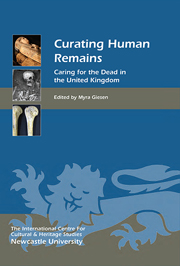Book contents
- Frontmatter
- Contents
- List of Illustrations
- Acknowledgments
- List of abbreviations
- Introduction: Human Remains Curation in the United Kingdom
- 1 International Perspectives towards Human Remains Curation
- 2 Dealings with the Dead: A Personal Consideration of the Ongoing Human Remains Debate
- 3 Care, Custody and Display of Human Remains: Legal and Ethical Obligations
- 4 The Impact and Effectiveness of the Human Tissue Act 2004 and the Guidance for the Care of Human Remains in Museums in England
- 5 Dead and Forgotten? Some Observations on Human Remains Documentation in the UK
- 6 Tethering Time and Tide? Human Remains Guidance and Legislation for Scottish Museums
- 7 The Quick and the Deid: A Scottish Perspective on Caring for Human Remains at the Perth Museum and Art Gallery
- 8 The Museum of London: An Overview of Policies and Practice
- 9 Curating Human Remains in a Regional Museum: Policy and Practice at the Great North Museum: Hancock
- 10 Curation of Human Remains at St Peter's Church, Barton-upon-Humber, England
- 11 Archaeological Human Remains and Laboratories: Attaining Acceptable Standards for Curating Skeletal Remains for Teaching and Research
- 12 ‘No Room at the Inn’ … Contract Archaeology and the Storage of Human Remains
- 13 Changes in Policy for Excavating Human Remains in England and Wales
- 14 Conclusions and Ways Forward
- Appendix 1 DCMS Guidance for the Care of Human Remains in Museums: Contents page and Part 2
- Appendix 2 MGS Guidelines for the Care of Human Remains in Scottish Museum Collections: Contents page and Chapter 2
- List of Contributors
- Index
- Miscellaneous Endmatter
14 - Conclusions and Ways Forward
Published online by Cambridge University Press: 05 May 2013
- Frontmatter
- Contents
- List of Illustrations
- Acknowledgments
- List of abbreviations
- Introduction: Human Remains Curation in the United Kingdom
- 1 International Perspectives towards Human Remains Curation
- 2 Dealings with the Dead: A Personal Consideration of the Ongoing Human Remains Debate
- 3 Care, Custody and Display of Human Remains: Legal and Ethical Obligations
- 4 The Impact and Effectiveness of the Human Tissue Act 2004 and the Guidance for the Care of Human Remains in Museums in England
- 5 Dead and Forgotten? Some Observations on Human Remains Documentation in the UK
- 6 Tethering Time and Tide? Human Remains Guidance and Legislation for Scottish Museums
- 7 The Quick and the Deid: A Scottish Perspective on Caring for Human Remains at the Perth Museum and Art Gallery
- 8 The Museum of London: An Overview of Policies and Practice
- 9 Curating Human Remains in a Regional Museum: Policy and Practice at the Great North Museum: Hancock
- 10 Curation of Human Remains at St Peter's Church, Barton-upon-Humber, England
- 11 Archaeological Human Remains and Laboratories: Attaining Acceptable Standards for Curating Skeletal Remains for Teaching and Research
- 12 ‘No Room at the Inn’ … Contract Archaeology and the Storage of Human Remains
- 13 Changes in Policy for Excavating Human Remains in England and Wales
- 14 Conclusions and Ways Forward
- Appendix 1 DCMS Guidance for the Care of Human Remains in Museums: Contents page and Part 2
- Appendix 2 MGS Guidelines for the Care of Human Remains in Scottish Museum Collections: Contents page and Chapter 2
- List of Contributors
- Index
- Miscellaneous Endmatter
Summary
Introduction
This volume is an attempt to clarify the current thinking on how we in museums, universities and other repositories that hold human remains care for and address the myriad issues that surround human remains. There has in the past been a lack of emphasis on what caring for human remains entails, which has given rise to the erroneous view that human remains in museums sit unused or unresearched on dusty shelves. We have in the past been too self-deprecating and reticent to really discuss what we do. This reluctance has to some extent led to the views expressed by the Working Group on Human Remains chaired by Norman Palmer (DCMs 2003). This viewpoint, often perpetuated by our fellow academics who have acted as consultants to communities, has also been fed to claimant communities who want remains returned from museum collections. These advisers have sometimes based this view on small local collections known to them and then extrapolated this to national collections; many of them neither engage in the care and curation of, nor undertake research on, human remains. The view is also convenient for calling into question why remains are in museums or other collections. This is not to say that the question should not be asked but that we as the specialists should be less reluctant to answer these questions and should quietly and carefully highlight the importance of the remains and the contribution they can make to our knowledge and understanding of the human condition, both in the past and present.
- Type
- Chapter
- Information
- Curating Human RemainsCaring for the Dead in the United Kingdom, pp. 159 - 166Publisher: Boydell & BrewerPrint publication year: 2013



